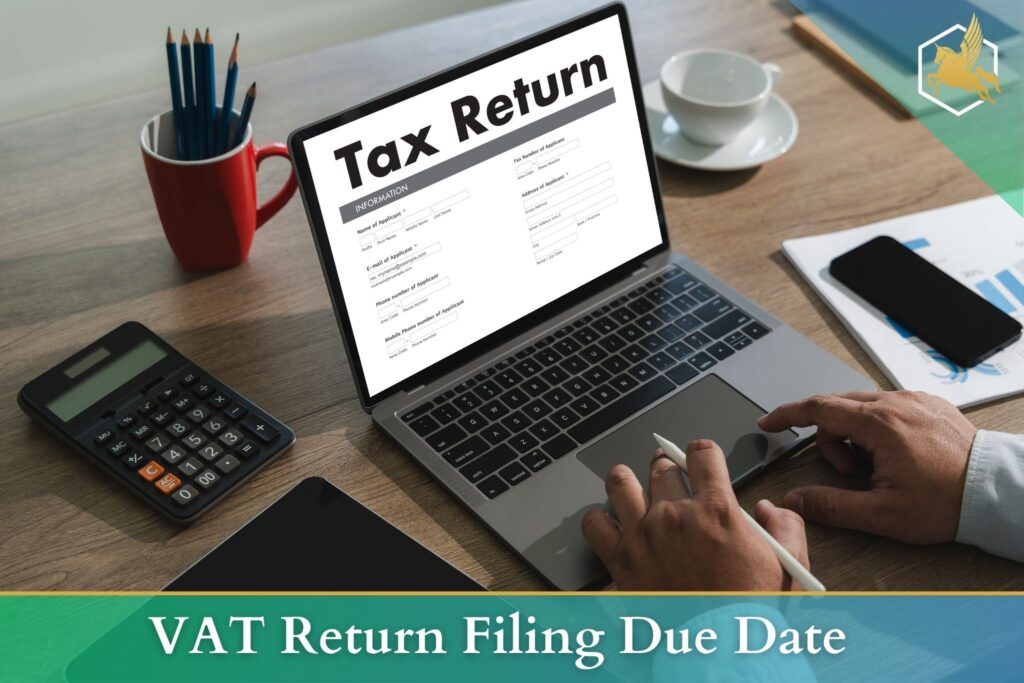Understanding the due date for filing VAT Return UAE is crucial for businesses to remain compliant with the Federal Tax Authority (FTA). Missing deadlines can result in penalties, additional costs, and compliance risks.
Currently, most companies in the UAE are assigned a quarterly VAT filing period, while businesses with higher turnover are often required to file VAT returns on a monthly basis. The Federal Tax Authority (FTA UAE) has also considered introducing a bi-annual VAT filing period for certain categories of businesses, including those with low turnovers and commercial property owners.

Yes. As per FTA guidelines, businesses can request to change their assigned VAT filing period.
“Where a Taxable Person is assigned the standard Tax Period, he may request that the Tax Period ends with the month as requested by him, and the FTA may accept such a request at its discretion.”
This means businesses that find it more convenient to align their VAT filing with specific months can request approval from the FTA.
The FTA has been working to simplify compliance and has announced the possibility of bi-annual VAT filing for selected business sectors. Companies falling under this new system will be notified about their updated VAT periods.
Additionally, the authority is developing electronic systems to make tax payments more seamless, particularly for industries such as real estate.
As per the UAE Cabinet Decision, every VAT-registered business must submit its VAT return and pay due tax no later than the 28th day following the end of the tax period. This deadline is commonly referred to as the UAE due date for filing VAT Return .
The FTA has emphasized that VAT returns should be submitted on time even if the business has zero supplies during that period. Delays in filing or payments can result in financial penalties.
AED 1,000 penalty for the first late filing.
AED 2,000 penalty for subsequent delays within 24 months.
In addition, the FTA may issue a Tax Assessment if returns are not submitted, requiring businesses to pay any due tax along with late payment penalties.
2% of unpaid tax charged immediately after the deadline.
4% of unpaid tax charged after seven days.
1% daily penalty on the unpaid amount after one month, continuing until settlement.
These penalties highlight the importance of adhering to the due date for filing VAT Return UAE to avoid additional costs
If a business decides to deregister, it must apply for VAT deregistration UAE with the FTA. Once approved, the business will be informed about the effective date of deregistration and the final VAT return period.
The final VAT return must be filed following the same rules as any other VAT return. Additionally, businesses must account for output tax on any goods, services, or assets for which input VAT has previously been claimed.
VAT Return Filing & Compliance
VAT Registration & Deregistration
Excise Tax Services
Representation as a Tax Agent UAE
The due date for filing VAT Return Dubai is not just a deadline but a legal requirement for businesses operating in the country. Submitting VAT returns by the 28th day of the tax period ensures compliance, avoids fines, and maintains smooth business operations.
If you are looking for expert support with VAT filing, deregistration, or other tax services, UGS can help you stay compliant with the FTA UAE and manage your tax obligations efficiently.
Value Added Tax (VAT) is a consumption tax applied to goods and services at each stage of production and distribution. It was introduced in the UAE on January 1, 2018 as part of the government’s efforts to diversify revenue sources.
The standard VAT rate in the UAE is 5% , applied to most goods and services. Some categories qualify for zero-rating (0%) or exemptions.
Taxable supplies include the sale of goods and services, imports, and certain transactions between businesses. These can be at the standard rate (5%) or zero-rated, depending on the nature of the goods or services.
Most businesses are required to file VAT returns quarterly(every three months). Some larger businesses may need to file monthly, as determined by the Federal Tax Authority (FTA).
Yes. Businesses registered for VAT can claim a refund (input VAT) on eligible expenses related to taxable supplies, provided they have valid tax invoices and meet FTA requirements.
Penalties can include monetary fines for late registration, late filing, incorrect returns, and failure to maintain proper records. These fines can range from AED 500 to AED 50,000 or more, depending on the violation.